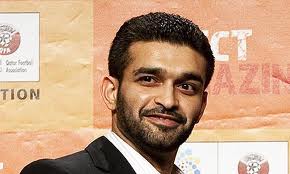By Andrew Warshaw
April 7 – The head of Qatar’s 2022 World Cup organising team says his country is “committed to positive change” despite the latest outpouring of adverse publicity over the treatment of migrant workers. Hassan Al-Thawadi admits he is “hurt” by the barrage of negative reporting, much of it emanating from the British media, and insists the World Cup will act as a catalyst for doing away with some of Qatar’s antiquated laws.
Last week, Jim Murphy, shadow international development secretary for Britain’s opposition Labour party, added his voice to those campaigning for improved conditions for those building facilities for the World Cup.
Murphy recently returned from a trip to Qatar during which he said he saw evidence of migrant workers being lured to the Gulf state by the promise of good salaries, only to have their passports taken away under the controversial ‘kafala’ employment system so they cannot return home.
He said it was time for the football authorities to put pressure on Qatar. “What I saw there will stick with me for a very long time,” said Murphy. “Unless FIFA and the football authorities act on workers’ rights in Qatar, the game that I love, I will be embarrassed by and ashamed by forever.
“The migrant workers working there – who are already building much of the infrastructure, the hotels, railways and roads that will help make the World Cup possible, and are now beginning to build the stadiums – are living and toiling in conditions that are sub-human. They sign on to contracts in countries such as Kenya and Bangladesh, they are promised wages that they couldn’t earn at home, but when they get there, their contracts are torn up. Many of them have their passports seized from them by their employers.
“They can’t leave the country. This is a dreadful, ugly secret of the most beautiful and democratic game in the world.”
But in an interview with the British commercial radio station TalkSport, Al-Thawadi hit back by saying Qatar was not sticking its head in the sand and that critics had to understand that the World Cup would speed up the very changes everyone is clamouring for.
“The reality is that the steps taken are going to be much faster as a result of the World Cup,” he said. “You can argue whether these steps are good enough, large enough or small enough. Yes there are issues and we recognise there is a problem. But some nations have had 100 to 150 years to develop. We have only just started. There is the good, the bad and the ugly and our commitment is to do away with the bad and the ugly.”
Whilst conceding that the introduction of trade unions “does not work right now” given Qatar’s demographics, Al-Thawadi added: “As far as confiscating passports is concerned, that’s illegal under Qatari law and for those companies that do, action will be taken. But it’s unrealistic …as we move towards an end goal, for people to say, as we take the first few steps, ‘yes but we want step number 15 to be delivered right now’.”
“Amnesty International has provided very positive feedback in terms of the steps we’ve already taken to try and improve things. We wholeheartedly welcome constructive criticism.”
But switching to constant unproven allegations of corruption, Al-Thawadi stressed again that Qatar “did not buy the World Cup” and that there was no need to revisit the bid process as many would like. “We took all relevant action to make sure we did not breach FIFA rules.”
So how did the tiny Gulf state win such a landslide victory in December, 2010, especially since no decision has yet been taken on whether to stage the event in summer or winter ?
“We worked harder than a lot of people,” responded Al-Thawadi who has constantly been in the firing line. “Does all the criticism hurt? Some of it definitely because everyone wants to see their country to be seen in a positive light. Some of the criticism does not accurately reflect what is going on.
“We put heart and soul into our bid and that’s what frustrates me. A lot of people said we were daft. (But) when people talk about us being too small, is that such a bad thing thing? Travel puts a lot of stress on people, looking for accommodation, looking for flights. Here, you are based in one place and get to watch more than one game a day and focus on what matters. We are the compact World Cup. A lot of people think this region has no passion for football. We are football nuts.”
Contact the writer of this story at moc.l1745207425labto1745207425ofdlr1745207425owedi1745207425sni@w1745207425ahsra1745207425w.wer1745207425dna1745207425


